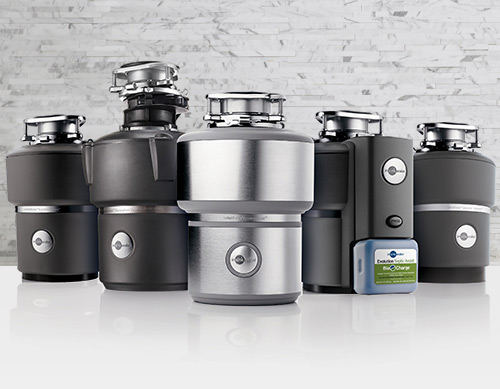Going One Step Greener: Garbage Disposals
Millions of tons of solid waste ends up in landfills each year in the form of food scraps that are disposed of in residential and commercial trash bins around the world. We are a planet of consumers, and your household is likely no different. You may already reduce, reuse, and recycle - but where do you dispose of your food waste? A garbage disposal can provide you with environmentally responsible way for your family to manage the food waste and food scraps that accumulate daily in your trash.
Reducing Your ‘Carbon Footprint' with a Garbage Disposal
Food waste can have a huge impact on the environment. Food waste that is tossed into your regular trash eventually makes its way to the landfill, where it begins to decompose rapidly. During decomposition, food waste begins to produce methane, which is a greenhouse gas that is 25 times more potent than carbon dioxide in trapping heat into the atmosphere (the greenhouse effect). Food waste also releases leachate, an acidic liquid residue that seeps into ground water, causing water pollution. The environmental cost of transporting food waste to the landfill also ties into your overall ‘carbon footprint' because the trucks used to haul food waste also release carbon emissions.
Garbage Disposals: One Link in Environmentally Friendly Chain
Installing a garbage disposal in your home makes you one link in an environmentally friendly chain. Because food waste is comprised of seventy percent water, it can easily be ground up in a garbage disposal and sent to a municipal waste water treatment plant. At the treatment plant, the methane gas from the food waste that is sent out of your home via your garbage disposal can be captured for use by power plants to create energy. In the landfill, this methane emission is detrimental to the environment; in the hands of a modern waste water treatment plant, however, it becomes a renewable and sustainable source of energy. In addition, the bio-solids that are left after your food waste is treated can be turned into soil conditioners and fertilizers that are eco-friendly and good for the Earth. garbage disposals use very little water, accounting for less than one percent of the average family's yearly water consumption. Besides extending a helping hand to the environment, garbage disposals also are wallet-friendly - costing less than fifty cents per year in electricity to operate.
Growing Popularity of Garbage Disposals
Installing a garbage disposal in your home is considered a kitchen upgrade, and can actually increase the overall value of your property. Among the many things that new home buyers look for when shopping for their dream home - stainless steel appliances, granite countertops, etc., is a garbage disposal. And with more and more people realizing that their personal waste can have a real impact on the state of the environment, the popularity of the garbage disposal is certain to increase, and its use will become more widespread in the years to come.
Designed to operate both efficiently and quietly, the high tech garbage disposals on the market today are quite different from their clunky counterparts of yesteryear. Another difference in earlier models and those of today is price. The market has opened up to where those on even the tightest budgets can afford a garbage disposal, with different models and price ranges to suit every consumer.
|
|



